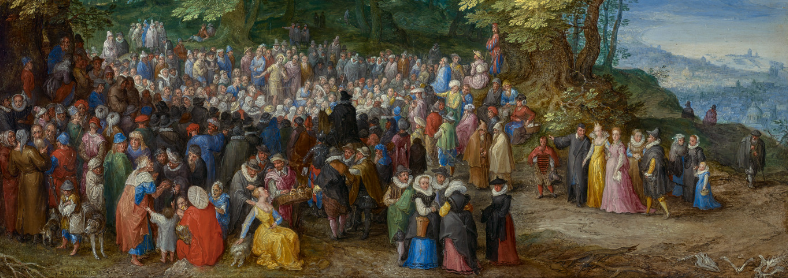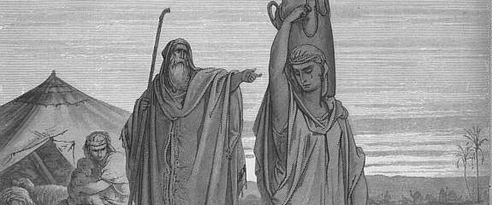Daughter, if You Don’t Like it, Change it; Your Father is Rich
January 29, 2012 | WHWC
When the Church of the Nazarene was very young, in 1924 Louise Robinson, later to become thewife of General Superintendent J. B. Chapman, embarked on her missionary service in Africa. Soon after arriving, she was assigned the unbelievable task of housing girls who ran away from betrothals into which they had been forced or sold. Thirty-two girls soon lived in one small room. The building could not be enlarged or improved because the mission had no funds, no building materials, and no security. The heartbreaking situation looked hopeless to the beginning missionary.
With understandable frustration, young Louise wrote to Dr. George Sharp, her supervisor, “This whole setup is impossible. I just do not like it at all.” Dr. Sharp shortly replied, “Daughter of the King, if you don’t like it, change it. Your Father is rich.”
That correspondence sounds extremely dissimilar from the words on a plaque someone gave me, “Whatever women do, they must do twice as well as men. Fortunately, that’s not difficult.” Though some may argue the statement contains a kernel of truth, the conclusion is wrong.
For our purpose, the issue regarding women ministers is not gender rights or competition, but the call of God. You see, almost everyone would agree that the acceptance of women in ministry is often difficult, sometimes prejudicial. But in keeping with Nazarene biblical beliefs, no one volunteers to be a career preacher. Nazarenes insist God calls whom He wills.
Consequently, the called woman preacher does not impulsively decide the ministry is to be her occupation. This call is the doing of God. He does the calling and the church is charged with responsibility to recognize and nurture that call. Women go into ministry because God calls them.
Hearing such a sacred summons, devout individuals regardless of gender respond with an unshakable conviction that they must obey. And for 2,000 years of Christian history, the called minister has accepted the ramifications, obstacles, and blessings of that call. Called women must have a comparable assurance if they are to survive the tests and disapproval with poise and piety.
Their inner certitude of God’s call puts the issue beyond debate, apology, or prejudice.
Legacy
The advocacy for women ministers has been a part of the holiness movement’s heritage beginning with John Wesley. Convincing authority may be found in the work of the Spirit, Scripture, religious experience, and inspiring history. And the accomplishments of many clergywomen help verify the validity of their calling.
Competent and credible
Though the rudimentary purpose of a call to ministry is to do something vital for God, it can never be accomplished without a sincere sense of mission. But to fully realize this calling, the woman preacher must be competent and credible. Skill must be demonstrated in preaching, evangelizing, and pastoring.
Like all Christian workers, the clergywoman ultimately finds acceptance in productive leadership and wholehearted involvement in people’s lives rather than in angry arguments about women’s rights or in vocal accusations of male counterparts. The woman minister serves best when her ministry is done in proficient ways that are pleasing to her Lord and life-changing to people.
This requires that the woman of God factually assess her gifts and graces and accurately identify her strengths and weaknesses. Then she can exercise her abilities to their greatest potential in the Kingdom of Christ. Abilities are given by God to produce results.
The woman minister pulls down barriers when she uses her creativity, faith, and nurturing skills to build a strong ministry and a growing church. That is precisely what missionary Louise Robinson did to change her situation in Africa and to set herself on a lifelong pilgrimage of being a change maker for the glory of God.
Tackle hard assignments
Many situations seem impossible to either men or women. But true change makers revitalize and even relish tough tasks.
For years I have watched Nazarene Bible College graduates, both male and female, go to their first pastorates. Those initial assignments often appeared to be bleak–someone called them “mankillers.” No one argued against the need for these beginners to have better places to start.
Better places simply were not available to them or else they were not called to more promising situations.
But faith, fasting, and tenacity sometimes generate achievements that surprise the members in those churches, astound the faculty, and please the district superintendents. They re-awaken churches using a variety of methods and lots of creativity. God blesses all work done in His name.
Similar situations are sometimes open to women. No one claims those opportunities are ideal or golden, but a ministry setting exists where people need a pastor.
This demanding kind of Kingdom work when done for love and with efficiency does more than make a reputation, even though a good record usually gets out on us. The challenge means more than great gain. Rather, it means meeting needs and enriching lives. It takes the Good News to human sinfulness and assists the Spirit of God to mend lives, forgive sins, and heal brokenness.
What needs to be done can be done. And we can do it with God’s help.
Agnes Diffee represents an incredible ministry model. Though she started in a small struggling church, in her prime she pastored Little Rock, Arkansas, First Church. Knowledgeable peers said she was known well enough to have been elected governor of her state had she chosen to run. Her vision to heal the broken hearted and preach to real needs prompted her and the church to own and operate radio station KARK. In addition to her regular duties of preaching, pastoring, and hospital visitation, Pastor Diffee spoke on the radio five to seven times each week. She acquired an exceptional library and testified to having read every book in it. Diligence to study and passion for the lost made her a respected preacher and honored pastor.
Make opportunities
If no vacancy or opening is offered, why not make one? I heard Emma Irick, veteran pastor and evangelist say about the early days of Nazarene church planting, “We went to towns where they did not want us and stayed until they could not get along without us.” That might be an impressive Magna Carta for ministry.
Our early women Nazarene preachers did not wait for opportunities, but driven by zeal for souls and righteousness, they set out to change conditions as they found them. They were effective pastors and evangelists, not because they lacked opposition, but because their hearts flamed with godly ambition to apply the gospel to life. They looked beyond every challenge because they felt their chief objective was to bring people to Christ. In an ultimate sense, no one can keep another from telling what they know about Christ.
Mainstream involvement
To be accepted, women musty not isolate themselves from the church’s mainstream. Instead, we must make ourselves visible and put our energy into programs of the church on the district and denominational level as well as the local church.
Look beyond difficulties
If we allow difficulties and discrimination to control us, they become insurmountable mountains.
Then we cannot see the work to be done or the victories to be accomplished. Why not recognize the reality that there may always be difficulties and then determine we will work in spite of them.
Our energy will not be dissipated by controversy regardless of how we feel about it. Then our God-given capabilities and competencies can be used to create a positive outlook about ourselves and our work.
Give up the anger and get to work
GROW Editor Neil B. Wiseman suggested these words as the title for this article. For several years we worked together on the faculty of Nazarene Bible College, and he has a way of nudging his colleagues to think about the heart of an issue. I admit I have been jittery about the proposed title, but editors have the last word on these things.
Though the statement may be too strong, the message is vital and discerning. No one, male or female, has time enough, however long his life may be, to argue about prejudices pointed at them and nurse anger about inequity.
Consider the facts
God calls, He keeps the records, and He has the final word. And in the Father’s wisdom, He invited us into His holy service. His trust warrants unconditional devotion. And His mandate obliges us to spend our energies to build His church.
Women ministers stand at the front line as the church and world approach the 21st century. If they will, clergywomen can generate new Kingdom vitality by doing their work well in the name of the Lord. Nothing can stop us, except ourselves.
“Daughter of the King–if you don’t like it, change it. Your Father is rich.”
Janet Smith Williams, now a Nazarene evangelist, enjoys a productive ministry that has included service as co-pastor with her husband, Roger; college teacher at Nazarene Bible College, Southern Nazarene University; and public school teacher. She served as a teen-age evangelist and was ordained by Dr. J. B. Chapman after having completed the home course of study before she went to Eastern Nazarene College. She holds degrees from Eastern Nazarene College, Nazarene Theological Seminary, and Denver Baptist Seminary. Janet ‘s extensive research on Nazarene women ministers adds authenticity to this article.
Williams, J. S. (Spring, 1992). Daughter–if you don’t like it, change it. Your father is rich. Grow, 33-35.
Enjoyed this article? Connect with us on one of our social media platforms. Share it and forward it to a friend:




